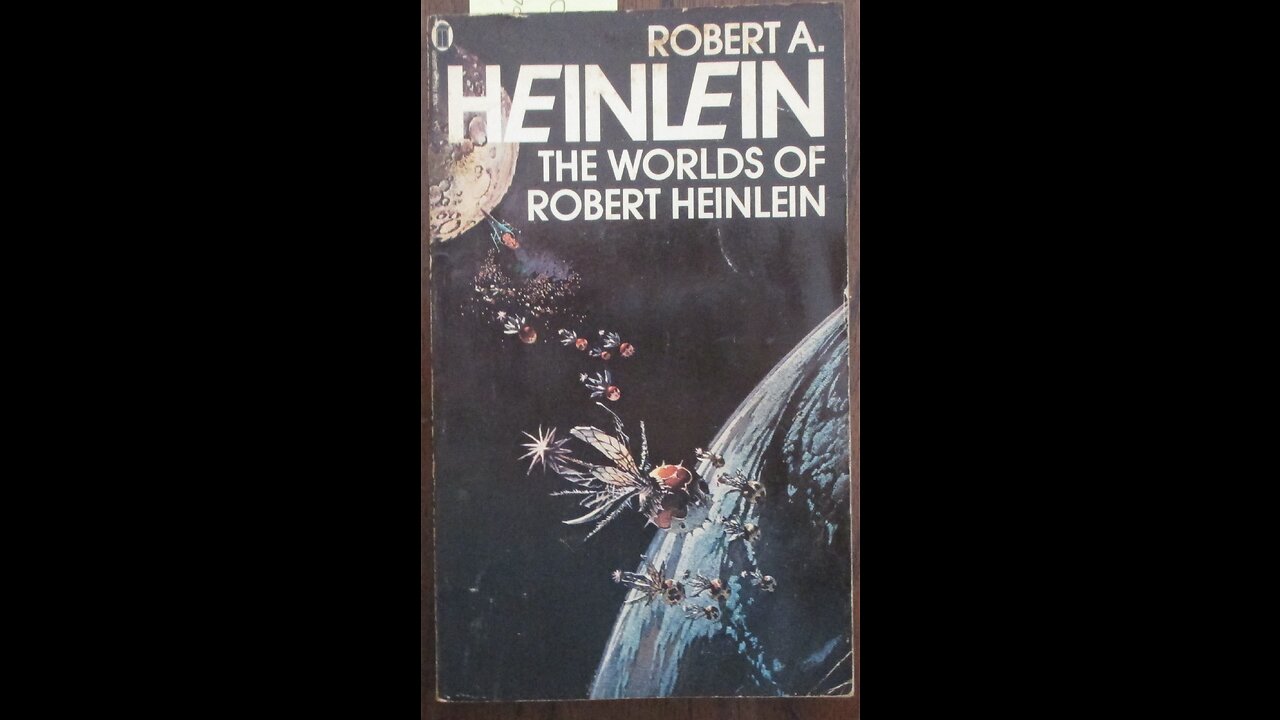Premium Only Content

The Worlds of Robert “A.” Heinlein, Copyright 1966. A Puke(TM) Audiobook
The Worlds of Robert “A.” Heinlein,
Copyright 1966,
Contents.
Introduction: PANDORA’S BOX. Copyright 1952.
FREE MEN, First time in print,
BLOWUPS HAPPEN. Copyright 1940.
SEARCHLIGHT. Copyright 1962.
LIFE-LINE Copyright 1939.
SOLUTION UNSATISFACTORY. Copyright 1940.
INTRODUCTION: PANDORA’S BOX.
ONCE OPENED, the Box could never be closed. But after the myriad swarming Troubles came Hope.
Science fiction is not prophecy. It often reads as if it were prophecy; indeed the practitioners of this odd genre (pun intentional I won’t do it again) of fiction usually strive hard to make their stones sound as if they were true pictures of the future. Prophecies.
Prophesying is what the weatherman does, the race track tipster, the stock market adviser, the fortune-teller who reads palms or gazes into a crystal. Each one is predicting the future sometimes exactly, sometimes in vague, veiled, or ambiguous language, sometimes simply with a claim of statistical probability, but always with a claim seriously made of disclosing some piece of the future.
This is not at all what a science fiction author does. Science fiction is almost always laid in the future or at least in a fictional possible-future and is almost invariably deeply concerned with the shape of that future. But the method is not prediction; it is usually extrapolation and, or speculation. Indeed the author is not required to (and usually does not) regard the fictional “future” he has chosen to write about as being the events most likely to come to pass; his purpose may have nothing to do with the probability that these storied events may happen.
“Extrapolation” means much the same in fiction writing as it does in mathematics: exploring a trend. It means continuing a curve, a path, a trend into the future, by extending its present direction and continuing the shape it has displayed in its past performance, meaning, if it is a sine curve in the past, you extrapolate it as a sine curve in the future, not as an hyperbola, nor a Witch of Agnesi and most certainly not as a tangent straight line.
“Speculation” has far more elbowroom than extrapolation; it starts with a “What if?” and the new factor thrown in by the what-if may be both wildly improbable and so revolutionary in effect as to throw a sine-curve trend (or a yeast-growth trend, or any trend) into something unrecognizably different. What if little green men land on the White House lawn and invite us to join a Galactic union? or big green men land and enslave us and eat us? What if we solve the problem of immortality? What if New York City really does go dry?
And not just the present fiddlin’ shortage tackled by fiddlin’ quarter-measures can you imagine a man being lynched for wasting an ice cube? Try Frank Herbert’s Dune World saga, which is not I judge prophecy in any sense, but is powerful, convincing, and most ingenious speculation. Living, as I do, in a state which has just two sorts of water, too little and too much we just finished seven years of drought with seven inches of rain in two hours, and one was about as disastrous as the other I find a horrid fascination in Dune World, in Charles Einstein’s The Day New York Went Dry, and in stories about Biblical-size floods such as S Fowler Wright’s Deluge.
Most science fiction stories use both extrapolation and speculation. Consider “Blowups Happen,” elsewhere in this volume. It was written in 1939, updated very slightly for book publication just after World War II by inserting some words such as “Manhattan Project and “Hiroshima,” but not rewritten, and is one of a group of stories published under the pretentious collective title of The History of the Future (!) which certainly sounds like prophecy.
I disclaim any intention of prophesying; I wrote that story for the sole purpose of making money to pay off a mortgage and with the single intention of entertaining the reader. As prophecy the story falls flat on its silly face any tenderfoot Scout can pick it to pieces but I think it is still entertaining as a story, else it would not be here; I have a business reputation to protect and wish to continue making money. Nor am I ashamed of this motivation. Very little of the great literature of our heritage arose solely from a wish to “create art”; most writing, both great and not-so-great, has as its proximate cause a need for money combined with an aversion to, or an inability to perform, hard writing offers a legal and reasonably honest way out of this dilemma.
A science fiction author may have, and often does have, other motivations in addition to pursuit of profit. He may wish to create “art for art’s sake,” he may want to warn the world against a course he feels to be disastrous (Orwell’s 1984, Huxley’s Brave New World but please note that each is intensely entertaining, and that each made stacks of money), he may wish to urge the human race toward a course which he considers desirable (Bellamy’s Looking Backwards, Wells’ Men Like Gods), he may wish to instruct, or uplift, or even to dazzle. But the science fiction writer any fiction writer must keep entertainment consciously in mind as his prime purpose, or he may find himself back dragging that old cotton sack.
If he succeeds in this purpose, his story is likely to remain gripping entertainment long years after it has turned out to be false “prophecy.” H G Wells is perhaps the greatest science fiction author of all time and his greatest science fiction stories were written around sixty years ago, under the whip. Bedfast with consumption, unable to hold a job, flat broke, paying alimony he had to make money somehow, and writing was the heaviest work he could manage. He was clearly aware, see his autobiography, that to stay alive he must be entertaining.
The result was a flood of some of the most brilliant speculative stories about the future ever written. As prophecy they are all hopelessly dated, which matters not at all; they are as spellbinding now as they were in the Gay ‘Nineties and the Mauve Decade.
Try to lay hands on his The Sleeper Awakes. The gadgetry in it is ingenious and all wrong. The projected future in it is brilliant and did not happen. All of which does not sully the story; it is a great story of love and sacrifice and blood-chilling adventure set in a matrix of mind-stretching speculation about the nature of Man and his Destiny. I read it first forty-five years ago, plus perhaps a dozen times since, and still reread it whenever I get to feeling uncertain about just how one does go about the unlikely process of writing fiction for entertainment of strangers and again finding myself caught up in the sheer excitement of Wells’ story.
“Solution Unsatisfactory” herein is a consciously Wellsian story. No, no, I’m not claiming that it is of H G Wells’ quality its quality is for you to judge, not me. But it was written by the method which Wells spelled out for the speculative story: Take one, just one, basic new assumption, then examine all its consequences but express those consequences in terms of human beings. The assumption I chose was the “Absolute Weapon”; the speculation concerns what changes this forces on mankind. But the “history” the story describes simply did not happen.
However the problems discussed in this story are as fresh today, the issues just as poignant, for the grim reason that we have not reached even an “unsatisfactory” solution to the problem of the Absolute Weapon; we have reached no solution.
In the twenty-five years that have passed since I wrote that story the world situation has grown much worse. Instead of one Absolute Weapon there are now at least five distinct types an “Absolute Weapon” being defined as one against which there is no effective defense and which kills indiscriminately over a very wide area. The earliest of the five types, the A-bomb, is now known to be possessed by at least five nations, at least twenty-five other nations have the potential to build them in the next few years.
But there is a possible sixth type. Earlier this year I attended a seminar at one of the nation’s new think-factories. One of the questions discussed was whether or not a “Doomsday Bomb” could be built a single weapon which would destroy all life of all sorts on this planet; one weapon, not an all-out nuclear holocaust involving hundreds or thousands of ICBMs. No, this was to be a world-wrecker of the sort Doctor E E Smith used to use in his interstellar sagas back in the days when S-F magazines had bug-eyed monsters on the cover and were considered lowbrow, childish, fantastic.
The conclusions reached were: Could the Doomsday Machine be built? Yes, no question about it. What would it cost? Quite cheap. A seventh type hardly seems necessary.
And that makes the grimness of “Solution Unsatisfactory” seem more like an Oz book in which the most harrowing adventures always turn out happily.
“Searchlight” is almost pure extrapolation, almost no speculation. The gadgets in it are either hardware on the shelf, or hardware which will soon be on the shelf because nothing is involved but straight-forward engineering development. “Life-Line” (my first story) is its opposite, a story which is sheer speculation and either impossible or very highly improbable, as the What-If postulate will never be solved I think. I hope. But the two stories are much alike in that neither depends on when it was written nor when it is read. Both are independent of any particular shape to history; they are timeless.
“Free Men” is another timeless story. As told, it looks like another “after the blowup” story but it is not. Although the place is nominally the United States and the time (as shown by the gadgetry) is set in the not-distant future, simply by changing names of persons and places and by inserting other weapons and other gadgets this story could be any country and any time in the past or future or could even be on another planet and concern a non-human race. But the story does apply here-and-now, so I told it that way.
“Pandora’s Box” was the original title of an article researched and written in 1949 for publication in 1950, the end of the half-century. Inscrutable are the ways of editors: it appeared with the title ‘Where To?’ and purported to be a non-fiction prophecy concerning the year 2000 A.D. as seen from 1950. I agree that a science fiction writer should avoid marihuana, prophecy, and time payments but I was tempted by a soft rustle.
Our present editor decided to use this article, but suggested that it should be updated. Authors who wish to stay in the business listen most carefully to editors’ suggestions, even when they think an editor has been out in the sun without a hat; I agreed.
And reread “Where To” and discovered that our editor was undeniably correct; it needed updating. At least.
But at last I decided not to try to conceal my bloopers. Below is reproduced, unchanged, my predictions of fifteen years back. But here and there through the article I have inserted signs for footnotes like this: (z) and these will be found at the end of the 1950 article, calling attention to bloopers and then forthrightly excusing myself by rationalizing how anyone, even Nostradamus, would have made the same mistake, hedging my bets, in other cases, or chucking in brand-new predictions and carefully laying them farther in the future than I am likely to live, and, in some cases, crowing loudly about successful predictions.
So.
WHERE TO?
And Why We Didn’t Get There.
Most science fiction consists of big-muscled stories about adventures in space, atomic wars, invasions by extra-terrestrials, and such. All very well but now we will take time out for a look at ordinary home life half a century hence.
Except for tea leaves and other magical means, the only way to guess at the future is by examining the present in the light of the past. Let’s go back half a century and visit your grandmother before we attempt to visit your grandchildren.
1900: Mister McKinley is President and the airplane has not yet been invented. Let’s knock on the door of that house with the gingerbread, the stained glass, and the cupola.
The lady of the house answers. You recognize her your own grandmother, Missus Middleclass. She is almost as plump as you remember her, for she “put on some good, healthy flesh” after she married.
She welcomes you and offers coffee cake, fresh from her modern kitchen (running water from a hand pump; the best coal range Pittsburgh ever produced). Everything about her house is modern hand-painted china, souvenirs from the Columbian Exposition, beaded portieres, shining baseburner stoves, gas lights, a telephone on the wall.
There is no bathroom, but she and Mr. Middleclass are thinking of putting one in. Mr. Middleclass’s mother calls this nonsense, but your grandmother keeps up with the times. She is an advocate of clothing reform, wears only one petticoat, bathes twice a week, and her corsets are guaranteed rust proof. She has been known to defend female suffrage but not in the presence of Mr. Middleclass.
Nevertheless, you find difficulty in talking with her. Let’s jump back to the present and try again.
The automatic elevator takes us to the ninth floor, and we pick out a door by its number, that being the only way to distinguish it.
“Don’t bother to ring,” you say? What? It’s your door and you know exactly what lies beyond it
Very well, let’s move a half century into the future and try another middle class home.
It’s a suburban home not two hundred miles from the city. You pick out your destination from the air while the cab is landing you a cluster of hemispheres which makes you think of the houses Dorothy found in Oz
You set the cab to return to its hangar and go into the entrance hall. You neither knock, nor ring. The screen has warned them before you touched down on the landing flat and the autobutler’s transparency is shining with: PLEASE RECORD A MESSAGE.
Before you can address the microphone a voice calls out, “Oh, it’s you! Come in, come in.” There is a short wait, as your hostess is not at the door. The autobutler flashed your face to the patio where she was reading and sunning herself and has relayed her voice back to you.
She pauses at the door, looks at you through one-way glass, and frowns slightly, she knows your old-fashioned disapproval of casual nakedness. Her kindness causes her to disobey the family psychiatrist; she grabs a robe and covers herself before signaling the door to open.
The psychiatrist was right; you have thus been classed with strangers, tradespeople, and others who are not family intimates. But you must swallow your annoyance; you cannot object to her wearing clothes when you have sniffed at her for not doing so.
There is no reason why she should wear clothes at home. The house is clean not somewhat clean, but clean and comfortable. The floor is warm to bare feet; there are no unpleasant drafts, no cold walls. All dust is precipitated from the air entering this house. All textures, of floors, of couch, of chair, are comfortable to bare skin. Sterilizing ultra-violet light floods each room whenever it is unoccupied, and, several times a day, a “whirlwind” blows house-created dust from all surfaces and whisks it out. These auto services are unobtrusive because automatic cut-off switches prevent them from occurring whenever a mass in a room is radiating at blood temperature.
Such a house can become untidy, but not dirty. Five minutes of straightening, a few swipes at children’s fingermarks, and her day’s housekeeping is done. Oftener than sheets were changed in Mr. McKinley’s day, this housewife rolls out a fresh layer of sheeting on each sitting surface and stuffs the discard down the oubliette. This is easy; there is a year’s supply on a roll concealed in each chair or couch. The tissue sticks by pressure until pulled loose and does not obscure the pattern and color.
You go into the family room, sit down, and remark on the lovely day. “Isn’t it?” she answers. “Come sunbathe with me.”
The sunny patio gives excuse for bare skin by anyone’s standards; thankfully she throws off the robe and stretches out on a couch. You hesitate a moment. After all, she is your own grandchild, so why not? You undress quickly, since you left your outer wrap and shoes at the door (only barbarians wear street shoes in a house) and what remains is easily discarded.
Your grandparents had to get used to a mid-century beach. It was no easier for them.
On the other hand, their bodies were wrinkled and old, whereas yours is not. The triumphs of endocrinology, of cosmetics, of plastic surgery, of figure control in every way are such that a woman need not change markedly from maturity until old age. A woman can keep her body as firm and slender as she wishes and most of them so wish. This has produced a paradox: the United States has the highest percentage of old people in all its two and a quarter centuries, yet it seems to have a larger proportion of handsome young women than ever before.
“Don’t whistle, son! That’s your grandmother.”
This garden is half sunbathing patio, complete with shrubs and flowers, lawn and couches, and half swimming pool. The day, though sunny, is quite cold but not in the garden, nor is the pool chill. The garden appears to be outdoors, but is not; it is covered by a bubble of transparent plastic, blown and cured on the spot. You are inside the bubble; the sun is outside; you cannot see the plastic.
She invites you to lunch; you protest. “Nonsense!” she answers, “I like to cook.” Into the house she goes. You think of following, but it is deliciously warm in the March sunshine and you are feeling relaxed to be away from the city. You locate a switch on the side of the couch, set it for gentle massage, and let the couch knead your troubles away. The couch notes your heart rate and breathing; as they slow, so does it. As you fall asleep it stops.
Meanwhile your hostess has been “slaving away over a hot stove.” To be precise, she has allowed a menu selector to pick out an 800-calory, 4-ration-point luncheon. It is a random choice gadget, somewhat like a slot machine, which has in it the running inventory of her larder and which will keep hunting until it turns up a balanced meal. Some housewives claim that it takes the art out of cookery, but our hostess is one of many who have accepted it thankfully as an endless source of new menus. Its choice is limited today as it has been three months since she has done grocery shopping. She rejects several menus; the selector continues patiently to turn up combinations until she finally accepts one based around fish disguised as lamb chops.
Your hostess takes the selected items from shelves or the freezer. All are prepared; some are pre-cooked. Those still to be cooked she puts into her well, her “processing equipment,” though she calls it a “stove.” Part of it traces its ancestry to diathermy equipment; another feature is derived from metal enameling processes. She sets up cycles, punches buttons, and must wait two or three minutes for the meal to cook. She spends the time checking her ration accounts.
Despite her complicated kitchen, she doesn’t eat as well as her great grandmother did too many people and too few acres.
Never mind; the tray she carries out to the patio is well laden and beautiful. You are both willing to nap again when it is empty. You wake to find that she has burned the dishes and is recovering from her “exertions” in her refresher. Feeling hot and sweaty from your nap you decide to use it when she comes out. There is a wide choice offered by the ‘fresher, but you limit yourself to a warm shower growing gradually cooler, followed by warm air drying, a short massage, spraying with scent, and dusting with powder. Such a simple routine is an insult to a talented machine.
Your host arrives home as you come out; he has taken a holiday from his engineering job and has had the two boys down at the beach. He kisses his wife, shouts, “Hi, Duchess!” at you, and turns to the video, setting it to hunt and sample the newscasts it has stored that day. His wife sends the boys in to ‘fresh themselves, then says, “Have a nice day, dear?”
He answers, “The traffic was terrible. Had to make the last hundred miles on automatic. Anything on the phone for me?”
“Weren’t you on relay?”
“Didn’t set it. Didn’t want to be bothered.” He steps to the house phone, plays back his calls, finds nothing he cares to bother with but the machine goes ahead and prints one message; he pulls it out and tears it off.
“What is it?” his wife asks.
“Telestat from Luna City from Aunt Jane.”
“What does she say?”
“Nothing much. According to her, the Moon is a great place and she wants us to come visit her.”
“Not likely!” his wife answers. “Imagine being shut up in an air-conditioned cave.”
“When you are Aunt Jane’s age, my honey lamb, and as frail as she is, with a bad heart thrown in, you’ll go to the Moon and like it. Low gravity is not to be sneezed at Auntie will probably live to be a hundred and twenty, heart trouble and all.”
“Would you go to the Moon?” she asks.
“If I needed to and could afford it.” He turns to you. “Right?”
You consider your answer. Life still looks good to you and stairways are beginning to be difficult. Low gravity is attractive, even though it means living out your days at the Geriatrics Foundation on the Moon. “It might be fun to visit,” you answer. “One wouldn’t have to stay.”
Hospitals for old people on the Moon? Lets not be silly.
Or is it silly? Might it not be a logical and necessary outcome of our world today?
Space travel we will have, not fifty years from now, but much sooner. It’s breathing down our necks. As for geriatrics on the Moon, for most of us no price is too high and no amount of trouble is too great to extend the years of our lives. It is possible that low gravity, one sixth, on the Moon, may not lengthen lives; nevertheless it may we don’t know yet and it will most certainly add greatly to comfort on reaching that inevitable age when the burden of dragging around one’s body is almost too much, or when we would otherwise resort to an oxygen tent to lessen the work of a worn-out heart.
By the rules of prophecy, such a prediction is probable, rather than impossible.
But the items and gadgets suggested above are examples of timid prophecy.
What are the rules of prophecy, if any?
Look at the graph shown here. The solid curve is what has been going on this past century. It represents many things use of power, speed of transport, numbers of scientific and technical workers, advances in communication, average miles traveled per person per year, advances in mathematics, the rising curve of knowledge. Call it the curve of human achievement.
What is the correct way to project this curve into the future? Despite everything, there is a stubborn “common sense” tendency to project it along dotted line number one like the patent office official of a hundred years back who quit his job “because everything had already been invented.” Even those who don’t expect a slowing up at once, tend to expect us to reach a point of diminishing returns, dotted line number two.
Very daring minds are willing to predict that we will continue our present rate of progress, dotted line number three-a tangent.
But the proper way to project the curve is dotted line number four for there is no reason, mathematical, scientific, or historical, to expect that curve to flatten out, or to reach a point of diminishing returns, or simply to go on as a tangent. The correct projection, by all facts known today, is for the curve to go on up indefinitely with increasing steepness.
The timid little predictions earlier in this article actually belong to curve one, or, at most, to curve two. You can count on the changes in the next fifty years at least eight times as great as the changes of the past fifty years.
The Age of Science has not yet opened.
AXIOM: A “nine-days’ wonder” is taken as a matter of course on the tenth day.
AXIOM: A “common sense” prediction is sure to err on the side of timidity.
AXIOM: The more extravagant a prediction sounds the more likely it is to come true.
So let’s have a few free-swinging predictions about the future.
Some will be wrong but cautious predictions are sure to be wrong.
1. Interplanetary travel is waiting at your front door C.O.D. It’s yours when you pay for it. “a.”
2. Contraception and control of disease is revising relations between sexes to an extent that will change our entire social and economic structure. (b)
5. The most important military fact of this century is that there is no way to repel an attack from outer space. (c)
4. It is utterly impossible that the United States will start a “preventive war.” We will fight when attacked, either directly or in a territory we have guaranteed to defend. (d)
5. In fifteen years the housing shortage will be solved by a “breakthrough” into new technology which will make every house now standing as obsolete as privies. (e)
6. We’ll all be getting a little hungry by and by.
7. The cult of the phony in art will disappear. So-called “modern art” will be discussed only by psychiatrists.
8. Freud will be classed as a pre-scientific, intuitive pioneer and psychoanalysis will be replaced by a growing, changing “operational psychology” based on measurement and prediction.
9. Cancer, the common cold, and tooth decay will all be conquered; the revolutionary new problem in medical research will be to accomplish “regeneration,” meaning, to enable a man to grow a new leg, rather than fit him with an artificial limb. (f)
10. By the end of this century mankind will have explored this solar system, and the first ship intended to reach the nearest star will be a-building. (g)
11. Your personal telephone will be small enough to carry in your handbag. Your house telephone will record messages, answer simple queries, and transmit vision.
12. Intelligent life will be found on Mars. (h)
13. A thousand miles an hour at a cent a mile will be commonplace; short hauls will be made in evacuated subways at extreme speeds. (i)
14. A major objective of applied physics will be to control gravity. ( j )
15. We will not achieve a “world state” in the predictable future. Nevertheless, Communism will vanish from this planet. (k)
16. Increasing mobility will disenfranchise a majority of the population. About 1990 a constitutional amendment will do away with state lines while retaining the semblance.
17. All aircraft will be controlled by a giant radar net run on a continent-wide basis by a multiple electronic “brain.”
18. Fish and yeast will become our principal sources of proteins. Beef will be a luxury; lamb and mutton will disappear. (l)
19. Mankind will not destroy itself, nor will “civilization” be destroyed. (m)
Here are things we won’t get soon, if ever:
Travel through time.
Travel faster than the speed of light
“Radio” transmission of matter.
Manlike robots with manlike reactions.
Laboratory creation of life.
Real understanding of what “thought” is and how it is related to matter.
Scientific proof of personal survival after death.
Nor a permanent end to war. (I don’t like that prediction any better than you do.)
Prediction of gadgets is a parlor trick anyone can learn; but only a fool would attempt to predict details of future history (except as fiction, so labeled); there are too many unknowns and no techniques for integrating them even if they were known.
Even to make predictions about overall trends in technology is now most difficult. In fields where before World War II there was one man working in public, there are now ten, or a hundred, working in secret. There may be six men in the country who have a clear picture of what is going on in science today. There may not be even one.
This is in itself a trend. Many leading scientists consider it a factor as disabling as the nonsense of Lysenkoism is to Russian technology. Nevertheless there are clear-cut trends which are certain to make this coming era enormously more productive and interesting than the frantic one we have just passed through. Among them are:
Cybernetics: The study of communication and control of mechanisms and organisms. This includes the wonderful field of mechanical and electronic “brains” but is not limited to it.
These “brains” are a factor in themselves that will speed up technical progress the way a war does.
Semantics: A field which seems concerned only with definitions of words. It is not; it is a frontal attack on epistemology that is to say, how we know what we know, a subject formerly belonging to long-haired philosophers.
New tools of mathematics and log, such as calculus of statement, Boolean logic, morphological analysis, generalized symbology, newly invented mathematics of every sort there is not space even to name these enormous fields, but they offer us hope in every other field medicine, social relations, biology, economics, anything.
Biochemistry: Research into the nature of protoplasm, into enzyme chemistry, viruses, etc., give hope not only that we may conquer disease, but that we may someday understand the mechanisms of life itself. Through this, and with the aid of cybernetic machines and radioactive isotopes, we may eventually acquire a rigor of chemistry. Chemistry is not a discipline today; it is a jungle. We know that chemical behavior depends on the number of orbital electrons in an atom and that physical and chemical properties follow the pattern called the Periodic Table. We don’t know much else, save by cut-and-try, despite the great size and importance of the chemical industry. When chemistry becomes a discipline, mathematical chemists will design new materials, predict their properties, and tell engineers how to make them without ever entering a laboratory. We’ve got a long way to go on that one!
Nucleonics: We have yet to find out what makes the atom tick. Atomic power? Yes, we’ll have it, in convenient packages when we understand the nucleus. The field of radioisotopes alone is larger than was the entire known body of science in 1900. Before we are through with these problems, we may find out how the universe is shaped and why. Not to mention enormous unknown vistas best represented by?
Some physicists are now using two time scales, the T-scale, and the tau-scale. Three billion years on one scale can equal an incredibly split second on the other scale and yet both apply to you and your kitchen stove. Of such anarchy is our present state in physics.
For such reasons we must insist that the Age of Science has not yet opened.
The greatest crisis facing us is not Russia, not the Atom bomb, not corruption in government, not encroaching hunger, nor the morals of young. It is a crisis in the organization and accessibility of human knowledge. We own an enormous “encyclopedia” which isn’t even arranged alphabetically. Our “file cards” are spilled on the floor, nor were they ever in order. The
answers we want may be buried somewhere in the heap, but it might take a lifetime to locate two already known facts, place them side by side and derive a third fact, the one we urgently need.
Call it the Crisis of the Librarian.
We need a new “specialist who is not a specialist, but a synthesist. (n) We need a new science to be the perfect secretary to all other sciences.
But we are not likely to get either one in a hurry and we have a powerful lot of grief before us in the meantime.
Fortune-tellers can always be sure of repeat customers by predicting what the customer wants to hear, it matters not whether the prediction comes true. Contrariwise, the weatherman is often blamed for bad weather.
Brace yourself.
In 1900 the cloud on the horizon was no bigger than a man’s hand but what lay ahead was the Panic of 1907, World War One, the panic following it, the Depression, Fascism, World War Two, the Atom Bomb, and Red Russia.
Today the clouds obscure the sky, and the wind that overturns the world is sighing in the distance.
The period immediately ahead will be the roughest, cruelest one in the long, hard history of mankind. It will probably include the worst World War of them all. It might even end with a war with Mars, God save the mark! Even if we are spared that fantastic possibility, it is certain that there will be no security anywhere, save what you dig out of your own inner spirit.
But what of that picture we drew of domestic luxury and tranquillity for Missus Middleclass, style 2000 A.D.?
She lived through it. She survived.
Our prospects need not dismay you, not if you or your kin were at Bloody Nose Ridge, at Gettysburg or trudged across the Plains. You and I are here because we carry the genes of uncountable ancestors who fought and won against death in all its forms. We’re tough. We’ll survive. Most of us.
We’ve lasted through the preliminary bouts; the main event is coming up.
But it’s not for sissies.
The Last thing to come fluttering out of Pandora’s box was Hope without which men die.
The gathering wind will not destroy everything, nor will the Age of Science change everything. Long after the first star ship leaves for parts unknown, there will still be outhouses in upstate New York, there will still be steers in Texas, and no doubt the English will still stop for tea.
Afterthoughts, fifteen years later.
(a) And now we are paying for it and the cost is high. But, for reasons understandable only to bureaucrats, we have almost halted development of a nuclear-powered spacecraft when success was in sight. Never mind; if we don’t, another country will. By the end of this century space travel will be cheap.
(b) This trend is so much more evident now than it was fifteen years ago that I am tempted to call it a fulfilled prophecy. Vast changes in sex relations are evident all around us with the oldsters calling it “moral decay” and the youngsters ignoring them and taking it for granted. Surface signs: books such as “Sex and the Single Girl” are smash hits; the formerly-taboo four-letter words are now seen both in novels and popular magazines; the neologism “swinger” has come into the language; courts are conceding that nudity and semi-nudity are now parts of the mores. But the end is not yet; this revolution will go much farther and is now barely started.
The most difficult speculation for a science fiction writer to undertake is to imagine correctly the secondary implications of a new factor. Many people correctly anticipated the coming of the horseless carriage; some were bold enough to predict that everyone would use them and the horse would virtually disappear. But I know of no writer, fiction or non-fiction, who saw ahead of time the vast change in the courting and mating habits of Americans which would result primarily from the automobile a change which the diaphragm and the oral contraceptive merely confirmed. So far as I know, no one even dreamed of the change in sex habits the automobile would set off.
There is some new gadget in existence today which will prove to be equally revolutionary in some other way equally unexpected. You and I both know of this gadget, by name and by function but we don’t know which one it is nor what its unexpected effect will be. This is why science fiction is not prophecy and why fictional speculation can be so much fun both to read and to write.
(c) I flatly stand by this one. True, we are now working on Nike-Zeus and Nike-X and related systems and plan to spend billions on such systems and we know that others are doing the same thing. True, it is possible to hit an object in orbit or trajectory. Nevertheless this prediction is as safe as predicting tomorrow’s sunrise. Anti-aircraft fire never stopped air attacks; it simply made them expensive. The disadvantage in being at the bottom of a deep “gravity well” is very great; gravity gauge will be as crucial in the coming years as wind gauge was in the days when sailing ships controlled empires. The nation that controls the Moon will control the Earth but no one seems willing these days to speak that nasty fact out loud.
(d) Since 1950 we have done so in several theaters and are doing so as this is written, in Viet Nam. “Preventive” or “pre-emptive” war seems as unlikely as ever, no matter who is in the White House. Here is a new prediction: World War Three, as a major, all-out war, will not take place at least until 1980 and could easily hold off until 2000. This is a very happy prediction compared with the situation in 1950, as those years of grace may turn up basic factors which (hopefully!) might postpone disaster still longer. We were much closer to ultimate disaster around 1955 than we are today much closer indeed than we were at the time of the Cuban Confrontation in 1962. But the public never knew it. All in all, things look pretty good for survival, for the time being and that is as good a break as our ancestors ever had. It was far more dangerous to live in London in 1664 to 5 than it is to live in a city threatened by H-bombs today.
(e) Here I fell flat on my face. There has been no breakthrough in housing, nor is any now in prospect instead the ancient, wasteful methods of building are now being confirmed by public subsidies. The degree of our backwardness in this field is hard to grasp; we have never seen a modern house. Think what an automobile would be if each one were custom-built from materials fetched to your home what would it look like, what would it do, and how much would it cost. But don’t set the cost lower than 100,000 dollars, nor the speed higher than 10 miles per hour, if you want to be realistic about the centuries of difference between the housing industry and the automotive industry. I underestimated, through wishful thinking, the power of human stupidity, a fault fatal to prophecy.
(f) In the meantime spectacular progress has been made in organ transplants and the problem of regeneration is related to this one. Biochemistry and genetics have made a spectacular breakthrough in “cracking the genetic code.” It is a tiny crack, however, with a long way to go before we will have the human chromosomes charted and still longer before we will be able to “tailor” human beings by gene manipulation. The possibility is there but not by year 2000. This is probably just as well. If we aren’t bright enough to build decent houses, are we bright enough to play God with the architecture of human beings?
(g) Our editor suggested that I had been too optimistic on this one but I still stand by it. It is still thirty-five years to the end of the century. For perspective, look back thirty-five years to 1930 the American Rocket Society had not yet been founded then. Another curve, similar to the one herewith in shape but derived entirely from speed of transportation, extrapolates to show faster-than-light travel by year 2000. I guess I’m chicken, for I am not predicting FTL ships by then, if ever. But the prediction still stands without hedging.
(h) Predicting intelligent life on Mars looks pretty silly after those dismal photographs. But I shan’t withdraw it until Mars has been thoroughly explored. As yet we really have no idea and no data as to just how ubiquitous and vaned life may be in this galaxy; it is conceivable that life as we don’t know it can evolve on any sort of a planet, and nothing in our present knowledge of chemistry rules this out. All the talk has been about life-as-we-know-it-which means terrestrial conditions.
But if you feel that this shows in me a childish reluctance to give up thoats and zitidars and beautiful Martian princesses until forced to, I won’t argue with you I’ll just wait.
(i) I must hedge number thirteen; the “cent” I meant was scaled by the 1950 dollar. But our currency has been going through a long steady inflation, and no nation in history has ever gone as far as we have along this route without reaching the explosive phase of inflation. Ten-dollar hamburgers? Brother, we are headed for the hundred-dollar hamburger for the barter-only hamburger. But this is only an inconvenience rather than a disaster as long as there is plenty of hamburger.
(j) This prediction stands. But today physics is in a tremendous state of flux with new data piling up faster than it can be digested; it is anybody’s guess as to where we are headed, but the wilder you guess, the more likely you are to hit it lucky. With “elementary particles” of nuclear physics now totaling about half the number we used to use to list the “immutable” chemical elements, a spectator needs a program just to keep track of the players. At the other end of the scale, “quasars” quasi-stellar bodies have come along; radio astronomy is now bigger than telescopic astronomy used to be; and we have redrawn our picture of the universe several times, each time enlarging it and making it more complex I haven’t seen this week’s theory yet, which is well, as it would be out of date before this gets into print. Plasma physics was barely started in 1950; the same for solid-state physics. This is the Golden Age of physics and it’s an anarchy.
(k) I stand flatly behind prediction number fifteen.
(I) I’ll hedge number eighteen just a little. Hunger is not now a problem in the USA and need not be in the year 2000 but hunger as a world problem and problem for us if we were conquered, a distinct possibility by 2000. Between our present status and that of subjugation lies a whole spectrum of political and economic possible shapes to the future under which we would share the worldwide hunger to a greater or lesser extent. And the problem grows. We can expect to have to feed around half a billion Americans circa year 2000-our present huge surpluses would then represent acute shortages even if we never shipped a ton of wheat to India.
(m) I stand by prediction number nineteen.
I see no reason to change any of the negative predictions which follow the numbered affirmative ones. They are all conceivably possible; they are all wildly unlikely by year 2000. Some of them are debatable if the terms are defined to suit the affirmative side definitions of “life” and “manlike,” for example. Let it stand that I am not talking about an amino acid in one case, nor a machine that plays chess in the other.
(n) Today the forerunners of these synthesists are already at work in many places. Their titles may be anything; their degrees may be in anything or they may have no degrees. Today they are called “operations researchers,” or sometimes “systems development engineers,” or other interim tags. But they are all interdisciplinary people, generalists, not specialists the new Renaissance Man. The very explosion of data which forced most scholars to specialize very narrowly created the necessity which evoked this new non-specialist. So far, this “unspecialty” is in its infancy; its methodology is inchoate, the results are sometimes trivial, and no one knows how to train to become such a man. But the results are often spectacularly brilliant, too this new man may yet save all of us.
I’m an optimist. I have great confidence in Homo Sapiens.
We have rough times ahead but when didn’t we? Things have always been “tough all over.” H-bombs, Communism, race riots, water shortage, all nasty problems. But not basic problems, merely current ones.
We have three basic and continuing problems: The problem of population explosion; the problem of data explosion; and the problem of government.
Population problems have a horrid way of solving themselves when they are not solved rationally; the Four Horsemen of the Apocalypse are always saddled up and ready to ride. The data explosion is now being solved, mostly by cybernetics’ and electronics’ men rather than by librarians and if the solutions are less than perfect, at least they are better than what Grandpa had to work with. The problem of government has not been solved either by the ‘Western Democracies” or the “Peoples’ Democracies,” as of now. Anyone who thinks the people of the United States have solved the problem of government is using too short a time scale. The peoples of the world are now engaged in a long, long struggle with no end in sight, testing whether one concept works better than another; in that conflict millions have already died and it is possible that hundreds of millions will die in it before year 2000. But not all.
I hold both opinions and preferences as to the outcome. But my personal preference for a maximum of looseness is irrelevant; what we are experiencing is an evolutionary process in which personal preference matters, at most, only statistically. Biologists, ecologists in particular are working around to the idea that natural selection and survival of the fittest is a notion that applies more to groups and how they are structured than it does to individuals. The present problem will solve itself in the cold terms of revolutionary survival, and in the course of it both sides will make changes in group structure. The system that survives might be called “Communism” or it might be called “Democracy” (the latter is my guess) but one thing we can be certain of: it will not resemble very closely what either Marx or Jefferson had in mind. Or it might be called by some equally inappropriate neologism; political tags are rarely logical.
For Man is rarely logical. But I have great confidence in Man, based on his past record. He is mean, ornery, cantankerous, illogical, emotional and amazingly hard to kill. Religious leaders have faith in the spiritual redemption of Man; humanist leaders subscribe to a belief in the perfectibility of Man through his own efforts; but I am not discussing either of these two viewpoints. My confidence in our species lies in its past history and is founded quite as much on Man’s so-called vices as on his so-called virtues. When the chips are down, quarrelsomeness and selfishness can be as useful to the survival of the human race as is altruism, and pig-headedness can be a trait superior to sweet reasonableness. If this were not true, these “vices” would have died out through the early deaths of their hosts, at least a half million years back.
I have a deep and abiding confidence in Man as he is, imperfect and often unlovable, plus still greater confidence in his potential. No matter how tough things are, Man copes. He comes up with adequate answers from illogical reasons. But the answers work.
Last to come out of Pandora’s Box was a gleaming, beautiful thing eternal Hope.
-
 7:00
7:00
PukeOnABook
10 days agoRahan. Episode 124. By Roger Lecureux. The Ally of Fire! A Puke (TM) Comic.
611 -
 LIVE
LIVE
Price of Reason
11 hours agoMainstream Media FEARS Extinction! Gladiator 2 Review! New DnD SCANDAL!
3,691 watching -
 LIVE
LIVE
Fresh and Fit
7 hours agoIsrael-Hezbollah Ceasefire & Reacting To Death Threats On X
5,786 watching -
 1:11:10
1:11:10
Steve-O's Wild Ride! Podcast
5 days ago $8.70 earnedDusty Slay Went From Selling Pesticides To Having A Netflix Special - Wild Ride #244
27K3 -
 1:16:02
1:16:02
CocktailsConsoles
5 hours agoBE PART OF THE GAME!!| Death Road to Canada | Cocktails & Consoles Livestream
19K1 -
 LIVE
LIVE
Phyxicx
7 hours agoWe're streaming again! - 11/26/2024
202 watching -
 LIVE
LIVE
GamingWithHemp
6 hours agoHanging with Hemp #103
1,353 watching -
 21:24
21:24
DeVory Darkins
1 day ago $10.23 earnedElon Musk and Tucker Carlson SHATTER Left Wing Media
36.5K35 -
 15:13
15:13
Stephen Gardner
4 hours ago🔥Breaking: Trump JUST DID the UNEXPECTED | Tucker Carlson WARNS America!
31.6K71 -
 1:18:01
1:18:01
Glenn Greenwald
9 hours agoWill Trump's Second Term Promote Economic Populism? Matt Stoller On Cabinet Picks To Fight Corporate Power; Should Liberals Cut Off Pro-Trump Friends & Family? | SYSTEM UPDATE #372
172K188